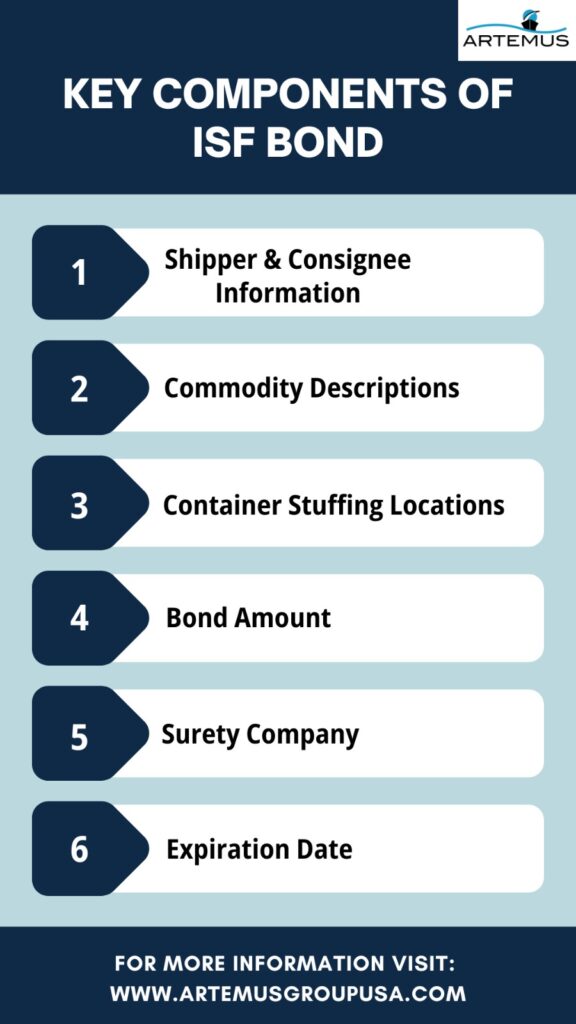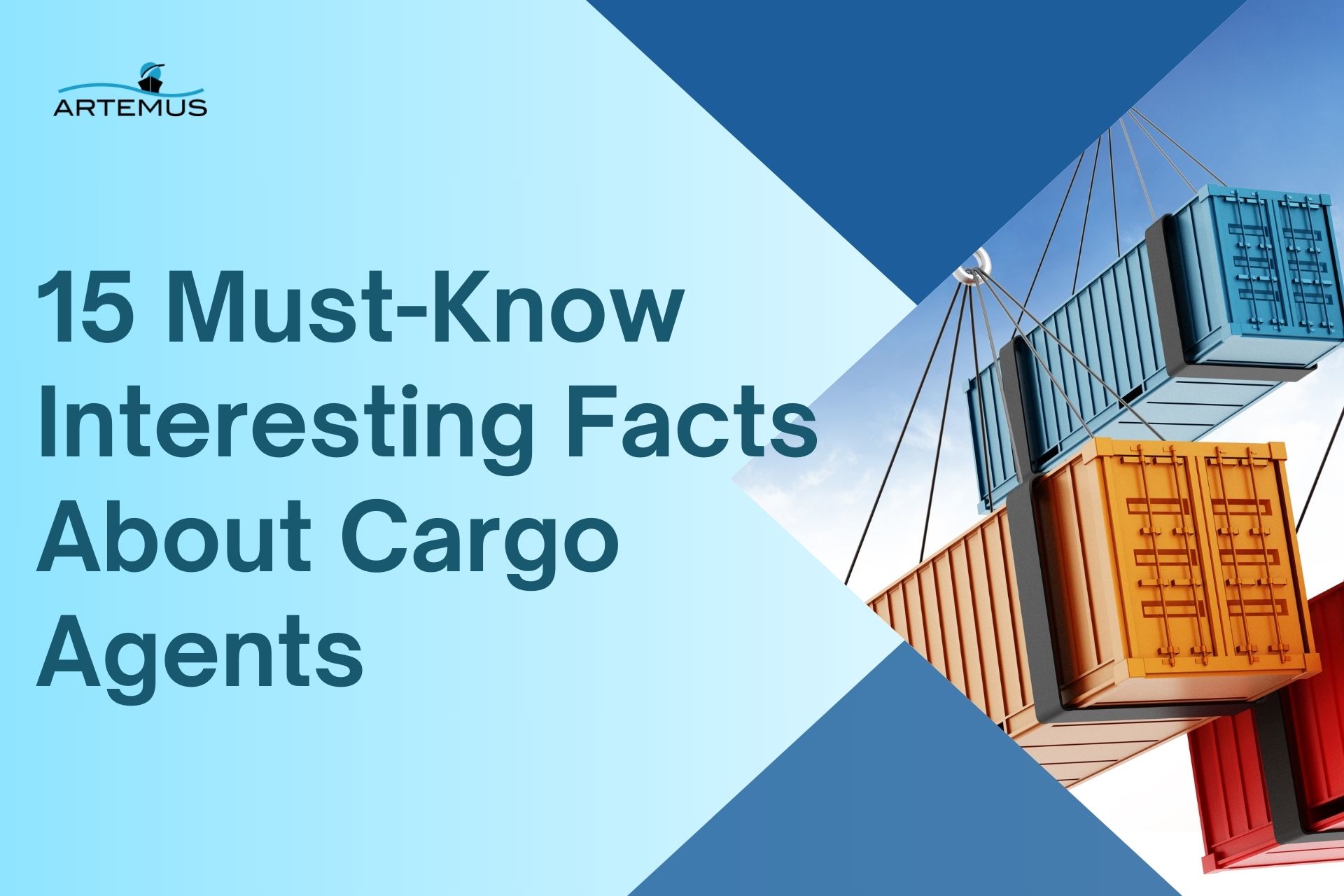
What Is Global Trade Management? A Complete 2025 Guide
In today’s interconnected world, businesses rely heavily on global trade to expand their markets, access new resources, and drive growth.

An ISF (Importer Security Filing) bond is a key requirement for importing goods into the U.S. by ocean vessel. It ensures compliance with U.S. Customs and Border Protection (CBP) rules by providing a financial guarantee that the importer will properly file an ISF form. Failure to comply with ISF regulations can lead to penalties or shipment delays.
This blog will explain what an ISF bond is, the different types, associated costs, and essential components you need to know.
Artemus Transportation Solutions simplifies the ISF filing process with its efficient, user-friendly software solution, ensuring compliance and reducing risks.
Table Of Contents
The ISF Bond, also known as the Importer Security Filing Bond, is a crucial component in the world of international shipping and customs clearance. It is a financial guarantee required by U.S. Customs and Border Protection (CBP) to ensure that importers fulfill their obligations and responsibilities related to the timely and accurate submission of Importer Security Filings (ISF).
Importer Security Filings are advanced information provided by importers about incoming cargo, detailing critical data such as shipper and consignee information, commodity descriptions, and container stuffing locations. This information enables CBP to assess potential security risks before the cargo arrives at U.S. ports of entry, allowing them to focus resources on high-risk shipments.
The ISF Bond serves as a commitment from the importer to comply with ISF requirements and helps guarantee that the information provided is accurate and timely. By posting the ISF Bond, importers assure CBP that they will submit complete and accurate ISF filings for their shipments.
Related: ISF Filing Requirements: Important Facts & Documents
The ISF Bond comprises several essential components that play a pivotal role in ensuring compliance with Importer Security Filing (ISF) requirements. These components collectively contribute to the smooth flow of goods through customs clearance processes. Here are the key components of the ISF Bond:

The bond includes accurate details about the shipper (the sender of the goods) and the consignee (the recipient of the goods). This information is critical for CBP to identify and verify parties involved in the trade.
Accurate and detailed descriptions of the imported goods are provided in the ISF Bond. Clear descriptions help CBP assess the nature of the cargo, ensuring security protocols align with the type of shipment.
The ISF Bond indicates where containers are loaded or “stuffed.” This information helps CBP determine potential security risks, ensuring that the container contents match the descriptions provided.
The ISF Bond specifies the financial amount that the importer guarantees to pay in case of non-compliance with ISF obligations. The bond amount is typically calculated based on the importer’s anticipated import duties and taxes.
The ISF Bond involves a surety company that acts as a guarantor for the importer’s compliance. The surety company commits to fulfilling the financial obligations if the importer fails to meet their ISF requirements.
Each ISF Bond has an expiration date, indicating the timeframe during which the bond remains valid. This date aligns with the chosen bond type, whether it’s a Single Entry Bond or a Continuous Bond.
These components collectively reinforce the commitment of importers to adhere to ISF regulations.
Related: ISF Filing Deadline: Timeline, Consequences, & Exceptions
When it comes to the Importer Security Filing (ISF) process, there are two primary types of bonds that importers can choose from: the Single Entry Bond and the Continuous Bond. Each type serves a distinct purpose in ensuring compliance with ISF requirements and facilitating smooth customs clearance. Here’s an overview of these two types of ISF bonds:
The Single Entry Bond is designed to cover a specific import transaction. It provides financial assurance that the importer will fulfill their ISF obligations for that particular shipment. Once the customs clearance process is completed for the covered shipment, the Single Entry Bond’s role concludes. This type of bond is ideal for occasional importers or those with infrequent shipments. It offers flexibility and is cost-effective for importers who don’t engage in regular trade activities.
On the other hand, the Continuous Bond offers coverage for multiple import transactions conducted by the importer over a specified period, usually a year. It serves as a comprehensive guarantee of compliance with ISF requirements for all shipments during the bond’s validity period. Importers engaged in frequent import and export activities often opt for a Continuous Bond, as it eliminates the need to obtain a new bond for each individual transaction. While the Continuous Bond involves a higher upfront cost, it proves beneficial for businesses with consistent trade operations.
Choosing between these two types of ISF bonds depends on the importer’s trade frequency, operational needs, and financial considerations. Whether it’s the flexibility of a Single Entry Bond or the comprehensive coverage of a Continuous Bond, both options play a crucial role in ensuring that importers meet their ISF obligations and contribute to the efficient flow of goods through the supply chain.
Related: 5 Types Of ISF Penalty & Fines To Know To Avoid Losses
The ISF (Importer Security Filing) Single Bond Fee is a charge applied when importing goods into the United States. This type of bond is required by U.S. Customs and Border Protection (CBP) to ensure compliance with security and reporting requirements. It applies specifically to infrequent shipments, where the bond covers a single import transaction.
The cost of an ISF Single Entry Bond typically ranges between $50 and $100, depending on factors such as the value of the goods and the service provider handling the bond.
Related: ISF Form (Import Security Filling): Elements & Top Practices
The ISF Continuous Bond Fee is a cost incurred by importers who frequently ship goods into the U.S. and choose to secure an annual bond instead of paying for each individual shipment.
The ISF (Importer Security Filing) Continuous Bond covers multiple shipments over a specified period, usually one year, ensuring compliance with U.S. Customs and Border Protection (CBP) regulations.
The continuous bond is a more cost-effective option for importers with regular shipments, as it eliminates the need to pay for a single bond per shipment. This type of bond not only covers the ISF filing but also ensures that all customs duties, taxes, and penalties are paid.
The ISF Continuous Bond is a strategic choice for businesses that aim to reduce costs and streamline their import operations while maintaining compliance with CBP regulations.
Related: ISF Declaration: Meaning, Purpose, Timeline, & Process
An ISF (Importer Security Filing) bond is a crucial requirement for businesses engaged in international trade. It ensures compliance with the U.S. Customs and Border Protection (CBP) regulations and guarantees the payment of potential fines or penalties. Here’s a step-by-step guide to acquiring an ISF bond:
Related: What Does ISF Stand For In Shipping? The 10+2 Rule Explained
Compliant ISF (Importer Security Filing) bond filings play a pivotal role in facilitating efficient and secure international trade operations. Here are some key benefits of ensuring your filings are in compliance with regulations:
Related: ISF Filing Cost: Elements, Hidden Costs, & Minimization Tips
The ISF bond is a financial guarantee required by U.S. Customs to ensure compliance with the Importer Security Filing (ISF) regulations, securing payment of penalties if the ISF filing is inaccurate or late.
The cost of an ISF bond varies but typically ranges between $50 and $500, depending on the bond type and the provider.
ISF stands for Importer Security Filing, a U.S. Customs requirement for ocean shipments entering the United States.
The single-entry bond for ISF generally costs around $50 to $150, depending on the shipment’s value and the bond provider.
ISF stands for “Importer Security Filing,” a mandatory requirement by U.S. Customs and Border Protection for importers to provide advance cargo information before goods are loaded onto a vessel bound for the United States.
The bond fee for an ISF (Importer Security Filing) can vary but generally ranges from $25 to $50 per filing.
The ISF form is filed by the importer or their authorized agent responsible for the cargo entering the United States.

In conclusion, the ISF Bond stands as a critical pillar in the realm of international trade, fostering security, compliance, and efficiency. By requiring importers to provide advance cargo information, this bond enables authorities to identify and address potential security risks while streamlining the flow of goods across borders. Its role in preventing delays, minimizing penalties, and maintaining a secure supply chain cannot be overstated.
As businesses continue to engage in global trade, grasping the essence of the ISF Bond equips them with the knowledge and tools necessary to navigate the complex landscape of international commerce with confidence.
Related: ISF Filing Online: A Beginner’s Guide To Your Import Process

In today’s interconnected world, businesses rely heavily on global trade to expand their markets, access new resources, and drive growth.

Importing goods for resale in the USA presents a lucrative business opportunity, but navigating the complexities of U.S. customs regulations,

Cargo agents are the backbone of the global logistics and shipping industries, managing the complex web of tasks that ensure
Get In Touch
Artemus’ Software Solutions for ISF, AMS, Japan AFR, eManifest Canada, & Panama B2B filings.